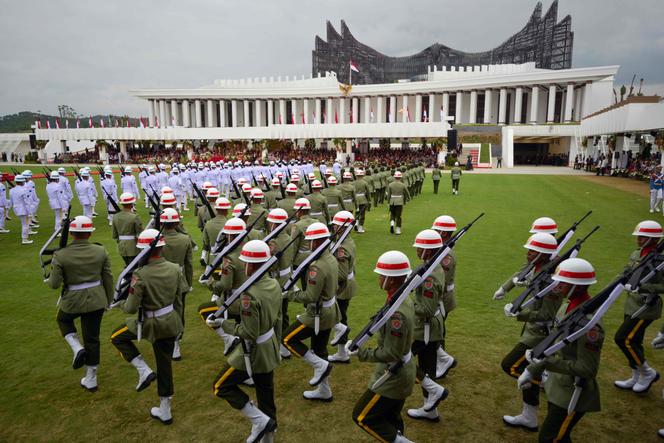


A promise kept, but in appearance only. On Saturday, August 17, Indonesian President Joko Widodo celebrated the country's Independence Day in Nusantara, Indonesia's future capital, as he had announced. In a simultaneous celebration, his vice president, Ma'ruf Amin, officiated from the presidential palace in Jakarta. Only 1,300 guests, out of the 8,000 initially planned, were invited to Borneo, where the capital is due to relocate, 1,200 kilometers from Jakarta. Foreign dignitaries and even diplomats based in Jakarta had been warned 10 days beforehand that they would not be making the trip. The presidential decree transferring the capital was postponed indefinitely.
And for good reason: the project, which was launched in 2021 and became law in 2022, has been plagued by delays. The new presidential palace, whose immense metal wings give it the silhouette of a Garuda, the mythical eagle symbolizing Indonesia, has certainly been built – "Jokowi," as the president is known, spent several nights there in early August – but the accommodation and office infrastructure is not yet ready. The airport that is supposed to welcome VIPs has not been completed, with ordinary visitors arriving via the airport in the town of Balikpapan, linked to the future capital by a freeway that is 90% complete.
Nusantara means "archipelago nation," referring to Indonesia and its 17,000 islands. Located at the geographic center of the country, on the large island of Borneo, Nusantara, like Brasilia, Brazil, and Astana, Kazakhstan, before it, is intended to promote the inward rebalancing of a nation of 288 million inhabitants, with marked disparities in population and development. Its designers, who want to make Nusantara a zero-carbon-emission capital by 2045, have chosen a largely uninhabited site, made up of paper-tree concessions and former coal mines. A total of 1.9 million inhabitants are expected by 2045, compared with Jakarta's current 11 million, which is sinking into the sea.
A proactive president who has made major construction projects the hallmark of his two terms in office, "Mr. Infrastruktur," as he is nicknamed, had sold his pet project by assuring that 80% of the financing, estimated at €29 billion up to 2045, would come from the private sector. However, while a handful of Indonesian groups were eager to get involved, multinationals and major foreign investment funds have been slow to respond.
The Indonesian government has had to spend 42 trillion rupiah (€2.44 billion) in the current financial year, and spent around the same amount in the previous one. "The new capital Nusantara is a canvas on which we can carve out the future," said Widodo at the first and exceptional Council of Ministers meeting held in Nusantara on August 12. "Not every country has the opportunity or ability to construct a new capital from zero," he said. The president also warned that the planned relocation of the first 10,000 civil servants in Nusantara in September would be delayed. It will take "10, 15, 20 years" for the new capital to take shape, said Widodo.
You have 33% of this article left to read. The rest is for subscribers only.
